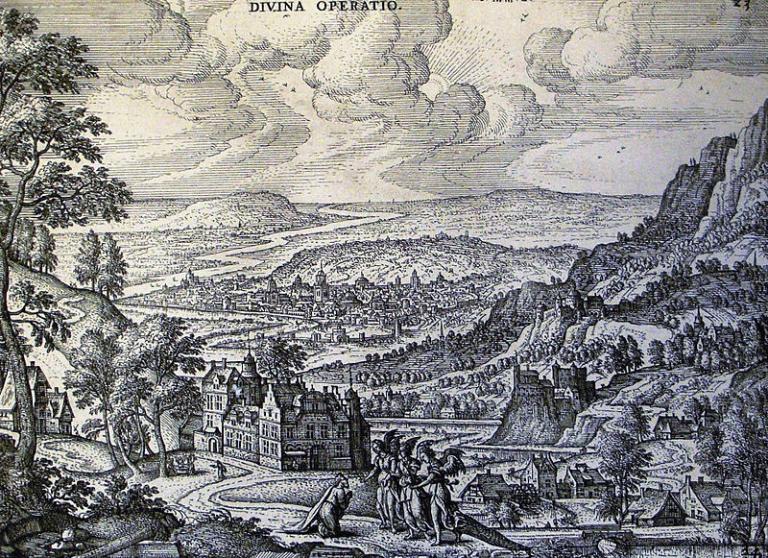
Incidentally, when critics attack the Church of Jesus Christ of Latter-day Saints for historically inaccurate art, I expect that they have images such as this one in mind as the preferable alternative. Here, a European artist has gone to enormous research effort in order to present the desert plains of biblical Mamre and the nomadic tents of Near Eastern bedouins with meticulous accuracy.
I published this article in the Deseret News on 14 February 2018:
Among the most valuable products of BYU’s former Foundation for Ancient Research and Mormon Studies, known as FARMS, was a massive collection of “Traditions about the Early Life of Abraham,” published in 2005 as part of its series of “Studies in the Book of Abraham.)” Ancient lore about the patriarch Abraham — not only in Jewish sources, but in Christian and Muslim texts, as well —is rich, and some of it is very relevant to the portrait of him given in the Pearl of Great Price.
Many years earlier, FARMS had been involved in producing a remarkable film profile bearing the title “The Faith of an Observer: Conversations with Hugh Nibley.” Toward the end of that film, beginning just before the 50-minute mark — the film is available in rather grainy form on youtube.com)) — Professor Nibley, who died in 2005, very movingly recounts a story about Abraham from the ancient rabbinic Jewish biblical commentary known as the “Midrash.”
It provides a background for Genesis 18, in which Abraham entertains three mysterious strangers. One of them proves to be the Lord himself and, from him, Abraham receives the promise for which he had long yearned, that he would be given a son as his heir.
In the Midrashic story, Abraham sits in his tent door on a horribly hot day in the plain of Mamre. He anxiously scans the horizon, fearful lest some wanderer has lost his way in the oppressive, lethal heat. He sends his servant Eleazer out to search, but Eleazer finds nobody. Still deeply concerned, Abraham himself goes out looking. An old man by now, and ill, he returns exhausted to his camp after a long but fruitless search for someone with whom he can share his shelter, water and hospitality.
It’s then that he sees those three strangers standing by his tent. And it’s then that his life-long dream of a son is granted to him (see Genesis 17-18 altogether). The implication is that he has received this blessing precisely because of his willingness to offer everything, even to risk his life, for the benefit of others — a willingness that’s illustrated by his selfless search for desperate travelers. “And in thy seed,” the angel of the Lord tells Abraham, “shall all the nations of the earth be blessed” (Genesis 22:18).
Sometimes called “the Friend of God” (James 2:23; compare Quran 4:125), Abraham is also known as “the father of all them that believe” (Romans 4:11; compare Galatians 3:16-29), and he is venerated not only in Judaism and Christianity but also in Islam. Indeed, Abraham is mentioned in the Quran 69 times, more than any other biblical figure except Moses.
A tradition attributed to the Islamic prophet Muhammad says that, on Judgment Day, God won’t even look at a man who, though he had surplus water, refused to share it with a thirsty desert wayfarer. And, perhaps not surprisingly, Abraham — whom the Bible portrays as essentially a nomadic Bedouin shaykh — serves as a prime illustration of the charity and hospitality that a Muslim should demonstrate.
A commonly told early Islamic legend tells of an aged Magian (a follower of the religion of Zoroastrianism) who sought hospitality with Abraham. (The chronology of the story is obviously problematic, since Magianism almost certainly didn’t exist at Abraham’s time.) According to this story, though, Abraham declines to receive the old man because he’s not a believer in the true God. Shortly thereafter, though, the patriarch receives a stern divine rebuke:
“You refused him food unless he converted,” the Lord tells Abraham, “but I have fed him for 70 years, despite his unbelief. How would it have hurt you to have granted him hospitality for one night?”
Chastened, Abraham runs after the old Zoroastrian, brings him back, feeds him and lodges him for the night. His guest is understandably curious about the patriarch’s sudden change of heart and asks its cause. Abraham answers by telling him about what the Lord had said to him. Hearing this, the aged man is so struck by God’s care for him that he asks to learn more about the religion of Abraham and, in the end, converts on the spot.
Faithful members of The Church of Jesus Christ of Latter-day Saints are promised that they are or can become “the seed of Abraham” (Doctrine and Covenants 84:34; 103:7). Jesus said that children of Abraham “do the works of Abraham” (John 8:39). Among those works, plainly, is welcoming refugees and caring for the needy.
Posted from Canmore, Alberta, Canada










